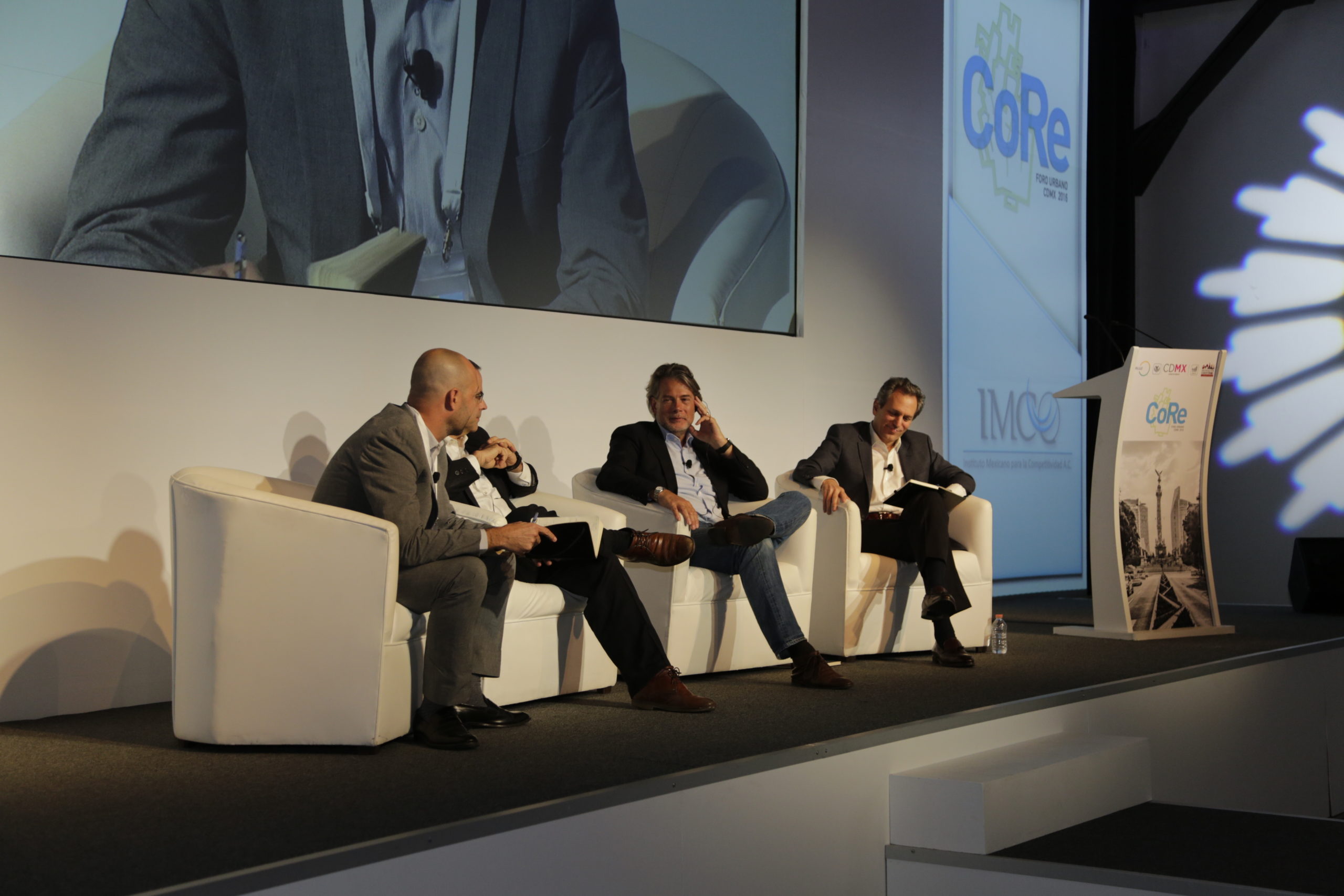In urban development, public policies must keep humans in mind
- $4 billion is currently invested in projects along Reforma Corridor, almost equivalent to the value of Canary Wharf in London
16 million people come every day to Mexico City to work and carry out various activities
Mexico City, December 7, 2016.- On the second day of the CoRe Foro Urbano CDMX 2016, Jan Gehl stressed during his keynote speech that public policies should focus on human beings and not on technology.
Gehl has focused his entire career on the urban environment of large cities such as New York and Sao Paulo and sustained that a city is far more enjoyable when walking 5km than driving for 60km. Gehl pointed out that cars have dulled the senses of smell, sight and enjoyment. “The new paradigm of urban planning tries to create livable cities which allows us to live a healthy life, that is, to focus on our health instead of focusing on technological maintenance”.
Ricardo Monreal, head of the Cuauhtémoc Delegation, said that he was attending the forum “not just from the government, but as a resident of this delegation, with the goal of thinking about the future of the city and the solutions being proposed here.”
Regarding Mexico City, he stressed that this should be an example of innovation and sustainability, “we are here to talk about our future, and we need to build a new social agreement that includes neighbors, developers and investors. New rules of coexistence are necessary.” An example of this is shown by the 4 billion dollars already invested along the Reforma Corridor.
During the third roundtable, which discussed Zoning and the Diverse City, academics, urban specialists, entrepreneurs and authorities agreed that future cities have to plan their development through the consensus of government, private initiative and citizens.
Salomon Chertorivski, head of Mexico City’s Secretariat of Economic Development, called for planners to bear the future in mind. He stressed that while 9 million people live within the borders of Mexico City, the city hosts 15-16 million people a day, meaning that planners must address questions such as where people live and work.
According to Felipe de Jesus Gutiérrez, Secretary of Housing and Urban Development (SEDUVI) for Mexico City, the city loses 80,000 citizens on a yearly basis, who move out to nearby areas. In other words, the city is losing its population. “We need to form an urban plan and a draft is under discussion in Mexico City’s Constituent Assembly.”
For Jose Shabot, from the Quiero Casa real estate group, “there are three relevant actors in every project: government, developers and the public”, while stating that entrepreneurs “must work under the law and help generate parks and public spaces”.
Maria Buhigas, from Urban Facts of Barcelona, said that Reforma Avenue in Mexico City “must not be thought of as a longitudinal axis, but as an avenue that unites”, adding that “we have to ask ourselves which conditions are necessary for people to live near their place of work.”
The fourth and final roundtable addressed citizen participation and responsibility, with Juan Pardinas, Director General of the Mexican Institute of Competitiveness (IMCO), stating that it is important to build a different idea of citizenship and vision.
Unlike the previous construction of citizenship grounded on racism, sexism and patriarchy, we currently need a dynamic construction: “Citizenship has to be seen as a toolbox that will serve to build the public space, including the votes of women and the opinions of the minority or marginalized, ” said Pardinas.
For Berkeley economist Steven W. Popper, the fundamental question is how to support a process of citizen participation and collaboration. From his perspective, there are three causes of mistrust that impede the construction of citizenship in Mexico: first, the coexistence of many people with different objectives, interests and fears, which can be a breeding ground for corruption; second, not understanding that the urban planning process is more important than the final product; and third, uncertainty, which is a risk without calculation.
In this discussion, María Amparo Casar mentioned that in Mexico the risk of participation is very different for citizens, especially since some are far more exposed to retaliation.
Casar added that “Mexico generally has low-intensity citizens, but we must recognize the causes of this low citizen participation. According to the surveys, very little progress has been made in terms of the rule of law since the 1950s. Surveys say that only 3 to 10 percent of Mexicans have participated in any activity of social manifestation, and most of those that have do so within a church setting. Statistics also reveal that Mexicans do not participate because of a lack of confidence and because they feel that participating, makes no difference.”
Antonio Del Valle Perochena, President of Kaluz, as well as by Riccardo Marini, from Gehl Architects, Juan Pardinas, General Director of IMCO, and José Castillo, curator of CoRe Urban Forum CDMX 2016 laid out the conclusions of the two-day forum on Mobility, Public Space, Zoning and Citizen Participation
Antonio del Valle Perochena, Chairman of the Board of Directors of Grupo Empresarial Kaluz, affirmed that “above all, we became citizens during these couple of days”.
He added that “the car should stop being the first priority for Mexico City’s citizens, and we must ensure that their first choice for transportation is to walk. We want to reach a consensus about the objectives of this city. The common goal is to have a better, more livable and friendly city”.
Closing the event, del Valle Perochena said that “we have discussed many ideas and issues that pose important challenges in the coming days” and committed himself to “record these ideas in a document containing specific proposals. That is the main objective of this event: to propose practical actions to transform Mexico City into the city we want to see in the future.
________________________________________________________________
About CoRe Urban Forum
This forum is made up of a group of citizens (entrepreneurs, academic, citizens, public servants, architects and urban designers), with one vision about the future of Mexico City, and a conviction about the great potential our city has. We are now facing a historic moment in which we can redefine the future, with a vision of a city which empowers all its citizens to the fullest and redefines quality of life for citizens and visitors alike. We seek to reshapre this city through four fundamental topics and a consensus to obtain the city we all want.
Press contacts
Francisco Galindo/ Pedro Suárez y Gerson Hernández


